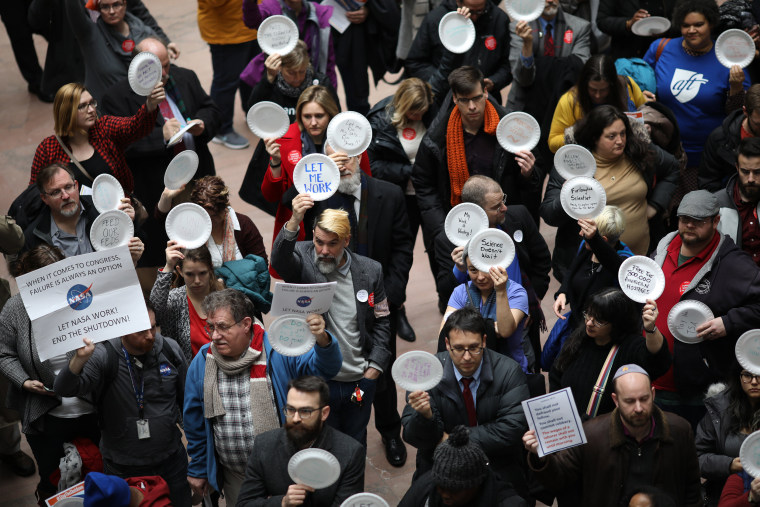The government shutdown has created a golden opportunity for scammers, who are targeting desperate federal workers struggling to pay their bills — and the people who want to help.
“People who are affected by the government shutdown have enough to worry about and should not also have to worry about a scammer preying on them,” said Virginia Attorney General Mark Herring in a scam alert released earlier this week.
Fraud fighters contacted by NBC News warned about three major shutdown-related scams:
- Fake job listings
- Bogus loan offers
- Fraudulent charity solicitations
Fake employment offers
Some federal workers who can’t wait any longer to get paid have taken on temporary work or a new full-time job. However, online employment ads are notorious for fraud, and job seekers should not let their guard down, say experts.
“Unfortunately, online job boards, like Craigslist, have long been a haven for scammers trying to lure job-seekers into bogus work-from-home schemes,” cautioned John Breyault, who runs the National Consumers Leagues’ Fraud.org website.
His advice: If you're asked to pay money to get a job, then it's a scam. Legitimate companies and employment agencies don’t do that.
Whether there’s a request for cash or not, don’t share any personal information, such as Social Security number, date of birth, bank or credit card information or income level, until you’ve had time to verify that this is a valid job offer from a legitimate company. That job application could be an attempt to harvest a treasure trove of information about you that can be used to commit identity theft.
Check with your state attorney general, local consumer protection office or Better Business Bureau for complaints about a potential employer. The Federal Trade Commission has information on job scams.
Phony loans
Federal workers who have an empty checking account and bills to pay are clearly more vulnerable to loan scams. These “pre-approved” offers could come in the mail, online or by phone.
“Be wary of anyone who calls you unsolicited and says, 'I know you're a furloughed employee and I want to help.’ They're just trying to establish credibility,” cautioned Amy Nofziger, director of fraud victim support with the AARP Fraud Watch Network. “Just remember that no reputable lender will give you money without doing a credit check.”
Her advice: Slow down, take a deep breath, do your research and look for red flags.
Even before the shutdown, AARP’s Fraud Watch Network was hearing about criminals using bogus social media messages — that look like they’re from a friend — talking about a great deal they got on a loan and sharing a link to get more information. The message has instant credibility because it appears to be coming from someone you know.
Warning: Your friends didn’t send you that message — their information was compromised or hacked. Click on the link and you could be asked for personal information or to pay an upfront fee via wire transfer or gift card. In some cases, you could also end up downloading malware onto your computer or smartphone.
“It is a huge red flag when someone wants you to prepay [an upfront fee] by wire or gift cards to get a loan,” Nofziger said. “It’s a scam, walk away real fast.”
The Federal Trade Commission has tips on how to spot advance-fee loan scams.
Charity scams
Many people have reached out to help government employees working without pay — but the Better Business Bureau urges caution. If history is any lesson, charity scammers are already trying to cash in on the generosity of the American people.
There may be some “questionable operators” who know “just what emotional buttons to push to get your money, so you need to be careful,” advised Bennett Weiner, chief operating officer of the BBB Wise Giving Alliance, which runs the website Give.org.
His advice: Don’t let a caller with an emotional story get you to give a credit or debit card number over the phone. You don’t know who they are or if the solicitation is genuine. If you’re interested, get the charity’s name, look them up online and check them out at Give.org, Charity Navigator or CharityWatch. If you like what you see, send a donation by check or do it on the organization’s website.
“Watch out for new charities created to address the shutdown,” Weiner advised. “While most are probably well intentioned, they may not be able to deliver quickly on the promised assistance.”
Chances are there are food banks and other social service charities in your area that could use some help, both in-kind gifts and money, he said.
One more caution: While crowdfunding has become a popular way to raise money, the BBB says it is best to limit your giving to individuals you know. Every crowdfunding site does not have effective vetting procedures to root out questionable requests that may come up.
